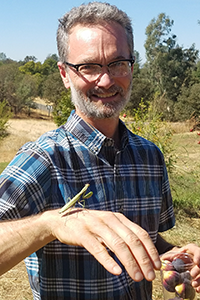

The year 2020 began like any other. And you know what happened next. In mid-March, we were instructed to work from home due to the coronavirus disease 2019 (COVID-19) caused by the severe acute respiratory syndrome coronavirus 2 (SARS-CoV 2). The initial “bend-the-curve” phase transitioned into months of remote work. UC IPM academics and staff adjusted, adapted, and persevered while continuing to deliver practical IPM information.
In retrospect UC IPM was fairly well prepared to transition to the new public health requirements of no inperson meetings. UC IPM had a library of asynchronous online continuing education courses available through eXtension, had previously hosted several online UC Ag Experts Talk webinars for continuing education units, and had some familiarity with Zoom as a virtual meeting space. Even with that leg up, UC IPM academics and staff had to learn how to maintain participant interest during multi-hour trainings. They were so successful that other groups, both in UC ANR and outside, looked to UC IPM staff for assistance in adult online education events.
Related to going all-virtual, our first all-virtual hiring process was completed in 2020. All the hiring committee meetings and the candidate interviews were conducted virtually for the Low Desert area IPM advisor position. Dr. Apurba Barman accepted the position and took a giant leap moving from Georgia without ever visiting Holtville. This position is also the first area IPM advisor position cofunded by a partner organization, in this case the Imperial County Board of Supervisors.
I don’t mean to downplay the situation—2020 was not an easy year.
In another first for UC IPM, we began the process of establishing trapping agreements for invasive shothole borers with the county agricultural commissioners throughout California. This effort was added to our master grant agreement with the California Department of Food and Agriculture (CDFA), which was originally established to support several research projects, a communications coordinator, and a trapping and survey data coordinator. The county agreements are to support county staff and travel to trap for invasive shothole borers to get a snapshot of their distribution in the state.
I don’t mean to downplay the situation—2020 was not an easy year. The mental, emotional, and physical toll of the pandemic was significant. And then there was the additional challenge from record-setting wildfires. Despite the challenges, UC IPM academics and staff continued to deliver practical, science-based IPM information to protect the economy, environment, and human-health while managing pests.